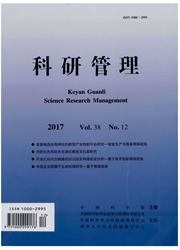

 中文摘要:
中文摘要:
本文以社会关系网络结构的视角,构建了高校社会资本对组织创新、教学与科研绩效产生影响的概念模型,并以我国69家高校作为调研对象进行了实证研究,通过多元回归分析和结构方程模型等方法检验了涵盖高校内外部社会网络的高校社会资本三维度的测量模型是可行有效的;证实了组织创新在高校社会资本影响教学与科研绩效过程中的中介作用;解析了内、外部社会资本的结构维、关系维、认知维对教学与科研绩效的直接和间接影响方面的效应差异及其交互作用。找到了高校关系维社会资本会对组织创新产生负效应的路径,论证了"强关系"和"过度信任"会产生负作用;但是综合高校内、外部社会资本各维度水平的交互总效应,它们对教学与科研绩效水平、组织创新能力的影响仍然是正向显著的。同时,本文也考察了"学校属性"、"办学历史"、"211工程"、"985工程"、"地理区域"作为控制变量对于高校教学与科研绩效的影响。
 英文摘要:
英文摘要:
Based on the past literature review in the special field of social capital,a conceptual model is developed to deduce the relationship among university social capital,organization innovation,and university performance.Considering the role of organization innovation,this empirical relationship is totally explored further between the university performance and three dimensions including structure,relationship,and cognition of the university social capital setting in the internal and external social network.The conclusions are based on the sample data of 69 colleges and universities in China.With the analysis of multiple linear regressions and the effects analysis in SEM,the model is acceptable,and the result shows that the property of college and the university have positive effects on teaching and research performance,and the mediation effect of organization innovation is confirmed.Also,through the SEM,the direct effects,indirect effects,and interactive effects of those variables are found.Except most theoretically proved hypothesis,it is remarkable that the result of effect analysis shows one path how the relational dimension of the university social capital has a negative effect on the organization innovation,and demonstrates the fact that the "excessive" trust and relationship could create encumbrance.Nevertheless,the total interactive effects of three dimensions of university social capital on university performance is certainly positive.At the same time,the property,the history,and the district of college and the universities are also taken into account.
 同期刊论文项目
同期刊论文项目
 同项目期刊论文
同项目期刊论文
 期刊信息
期刊信息
